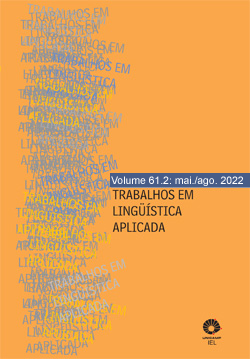Abstract
This article explores aspects of an illiterate Adult and Youth Education (EJA, in Brazil) student’s personal and academic trajectory. To investigate these aspects, we seek to answer this question: how are the student’s funds of perezhivania structured, in the school context, considering that he is learning how to read and write at the age of twenty? To answer it, we discuss the notions of perezhivanie (VYGOTSKY, 2010; REY, 2016; VERESOV, 2016), agency (NININ; MAGALHÃES, 2016), repertoire (BLOMMAERT, BACKUS, 2012; BUSCH, 2017; GUIMARÃES, MOITA LOPES, 2017), and funds (of knowledge, identity, and perezhivania) (MOLL et al., 1992; ESTEBAN-GUITART, MOLL, 2014; LIBERALI, MEGALE, 2020). The research method is qualitative-interpretative research (case study). The procedures to gather data are one semi-structured interview and conversations between student and researcher-teacher. Based on the literature review, our data interpretation suggests that there is a transformation in the subject’s agency. We believe that internal and external factors, as well as the student-teacher relationship and the student’s interaction with the school, led to this transformation. These changes constitute the subject’s funds of perezhivania.
References
AHEARN, Laura M. (2001). Language and agency. Annual Review of Anthropology, vol. 30, s.n., p. 109-137. Disponível em:<https://www.annualreviews.org/doi/abs/10.1146/annurev.anthro.30.1.109>. Acesso em: 25 ago. 2019.
AZZARI, Eliane Fernandes. (2018). Mobilidade, paisagens digitais e práticas (trans)linguísticas. The ESPecialist, São Paulo, v. 39, n. 2, p. 1-15.
BAUMAN, Richard; BRIGGS, Charles. (1990). Poetics and performance as critical perspectives on language and social life. Annual Review of Anthropology, California, n.19, p. 59-88.
BORTONI-RICARDO, Stella Maris. (2008). O professor pesquisador: introdução à pesquisa qualitativa. São Paulo: Parábola Editorial.
BLOMMAERT, Jan.; BACKUS, Ad. (2012). Superdiverse Repertoires and the Individual. Tilburg Papers in Cultural Studies, v. 24, p. 1-32.
BLOMMAERT, Jan. (2015). Chronotopes, scales and complexity in the study of language in society. Annual Review of Anthropology, v. 44, p. 105-116.
BUCHOLTZ, Mary. (2009). From stance to style. In: JAFFE, Alexandra. Stance: sociolinguistic perspectives. Oxford Scholarship Online, 2009. p. 1-49. Disponível em: <https://web.stanford.edu/~eckert/PDF/bucholtz2009.pdf>. Acesso em: 14 ago. 2021. doi: 10.1093/acprof:oso/9780195331646.003.0007.
BUSCH, Brigitta. (2017). Expanding the Notion of the Linguistic Repertoire: On the Concept of Spracherleben – The Lived Experience of Language. Applied Linguistics. Oxford: University Press, v. 38, n. 3, p. 340-358.
EDWARDS, Anne. (2005). Relational agency: learning to be a resourceful practioner. International Journal of Educational Research, v. 43, n. 3, p.168-182.
ESTEBAN-GUITART, Moises; MOLL, Luis (2014). Funds of Identity: A new concept based on the Funds of Knowledge approach. Culture & Psychology. Vol. 20(1), p. 31-48.
FREIRE, Paulo. (1974/1987). Pedagogia do oprimido. Rio de Janeiro: Paz e Terra.
FREIRE, Paulo. (1993/2017). Professora sim, tia não: cartas a quem ousa ensinar. 27.ed. Rio de Janeiro/ São Paulo: Paz e Terra.
GALVÃO, Ana Maria de Oliveira; DI PIERRO, Maria Clara. (2012). Preconceito contra analfabeto. 2ª ed. São Paulo: Cortez.
GUIMARÃES, Thayse Figueira; MOITA LOPES, Luiz Paulo da. (2017). Trajetória de um texto viral em diferentes eventos comunicativos: entextualização, indexicalidade, performances identitárias e etnografia. Alfa: Revista de Linguística, São Paulo, v. 61, n. 1, p. 11-33.
IBGE. Pesquisa Nacional por Amostra de Domicílios Contínua: Educação 2019. 2020. Disponível em: <https://biblioteca.ibge.gov.br/visualizacao/livros/liv101736_informativo.pdf>. Acesso em: 28 maio 2021.
LIBERALI, Fernanda Coelho; FUGA, Valdite Pereira. (2018). A importância do conceito de perezhivanie na constituição de agentes transformadores. Estudos de Psicologia, Campinas, v. 35, n. 4, p. 363-373.
LIBERALI, Fernanda Coelho; ROCHA, Cláudia Hilsdorf. (2017). Ensino de línguas nos anos iniciais de escolarização: reflexões sobre bilinguismo e letramentos. In: RODRIGUES, A. F.; FORTUNATO, M. P. (Orgs.). Alfabetização e letramento: prática reflexiva no processo educativo. São Paulo: Humanitas, p. 127-144.
LIBERALI, Fernanda Coelho. Atividade social nas aulas de língua estrangeira. São Paulo: Moderna, 2009.
MANZATI, Guilherme Rittner. Projeto Digit-M-Ed-Hiperconectando: alunos como formadores no ambiente escolar. São Paulo, 2018. 123 p. Dissertação (Mestrado em Linguística Aplicada e Estudos da Linguagem) – Pontifícia Universidade Católica de São Paulo.
MEGALE; Antonieta Heyden; LIBERALI, Fernanda Coelho. (2020). As implicações do conceito de patrimônio vivencial como uma alternativa para a educação multilíngue. Revista X, v.15, n.1, p. 55-74.
MOLL, Luis C.; AMANTI, Cathy; NEFF, Deborah; GONZÁLEZ, Norma. (1992). Funds of knowledge for teaching: using a qualitative approach to connect homes and classrooms. Theory into Practice, vol. 31, n. 2, pp. 132–141.
NININ, Maria Otília.; MAGALHÃES, Maria Cecília Camargo. (2017). A linguagem da colaboração crítica no desenvolvimento da agência de professores de ensino médio em serviço. Alfa: Revista de Linguística, São Paulo, v. 61, n. 3, p. 625-652.
POOLE, Adam; HUANG, Jingyi. (2018). Resituating funds of identity within contemporary interpretations of perezhivanie. Mind, Culture, and Activity, v. 25, n. 2, p. 125-137.
REY, Fernando González. (2016). Vygotsky’s Concept of Perezhivanie in The Psychology of Art and at the Final Moment of His Work: Advancing His Legacy.Abingdon: Routledge. Mind, culture, and activity. v. 23, n. 4, p. 1-10.
STETSENKO, Anna. (2019). Creativity as dissent and resistance: Transformative approach premised on social justice agenda. In: LEBUDA, I.; GLAVEANU, V. (Org.). The Palgrave Handbook of Social Creativity, Londres: Springer, p. 431-446.
VERESOV, Nikolai. (2016). Perezhivanie as a phenomenon and a concept: Questions on clarification and methodological meditations. Cultural-historical psychology, Frankston, Australia: Australia Monash University, vol. 12, n. 3, p. 129-148.
VINHA, Márcia Pileggi; WELCMAN, Max. (2010). Quarta aula: a questão do meio na pedologia. Lev Semionovich Vygotsky. Psicol. USP, São Paulo, v. 21, n. 4, p. 681-701, 2010.
VIRKKUNEN, Jaakko. (2006). Dilemmas in building shared transformative agency. Activités. França, vol. 3, n. 1, p. 43-66.
YIN, Robert K. (2016). Pesquisa qualitativa do início ao fim. Trad. Daniel Bueno. Revisão técnica: Dirceu da Silva. Porto Alegre: Penso.
ZALTRON, Michele A. (2012). “Переживание” (perejivanie) e o “trabalho do ator sobre si mesmo” em K. Stanislavski. Anais do VII Congresso da ABRACE - Associação Brasileira de Pesquisa e Pós-graduação em Artes Cênicas. Porto Alegre, p. 1-7.

This work is licensed under a Creative Commons Attribution 4.0 International License.
Copyright (c) 2022 Trabalhos em Linguística Aplicada


